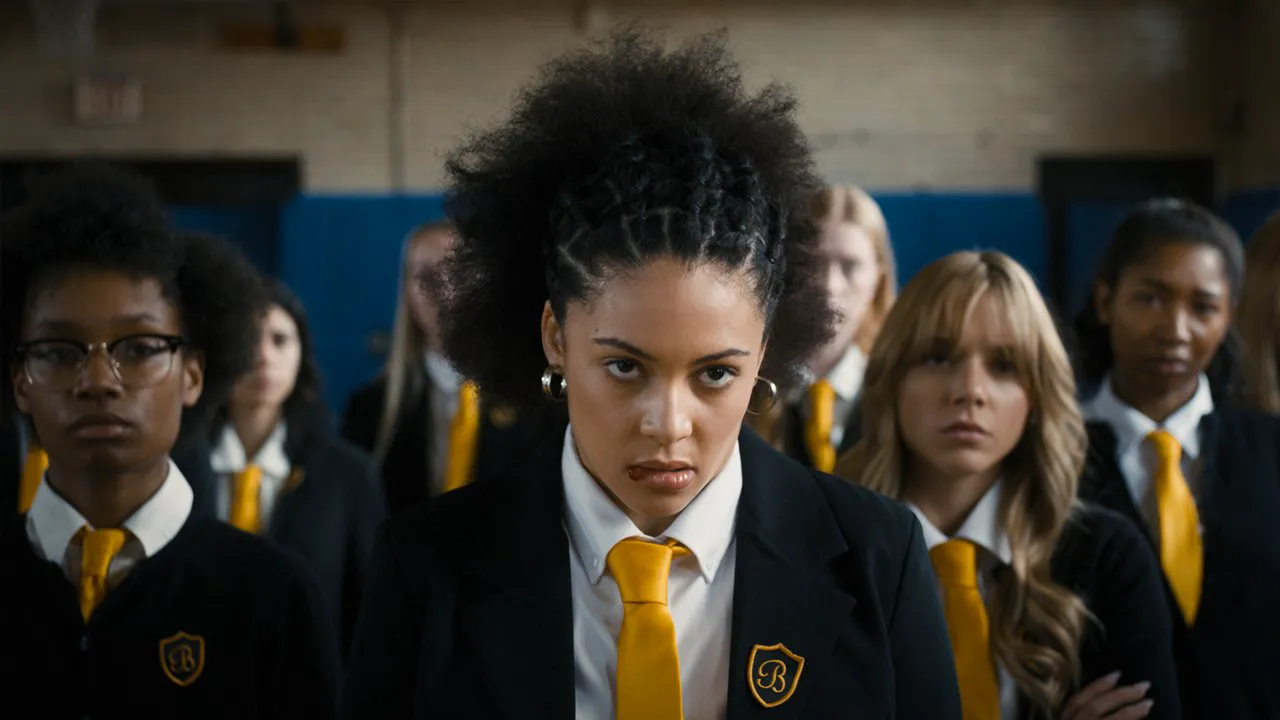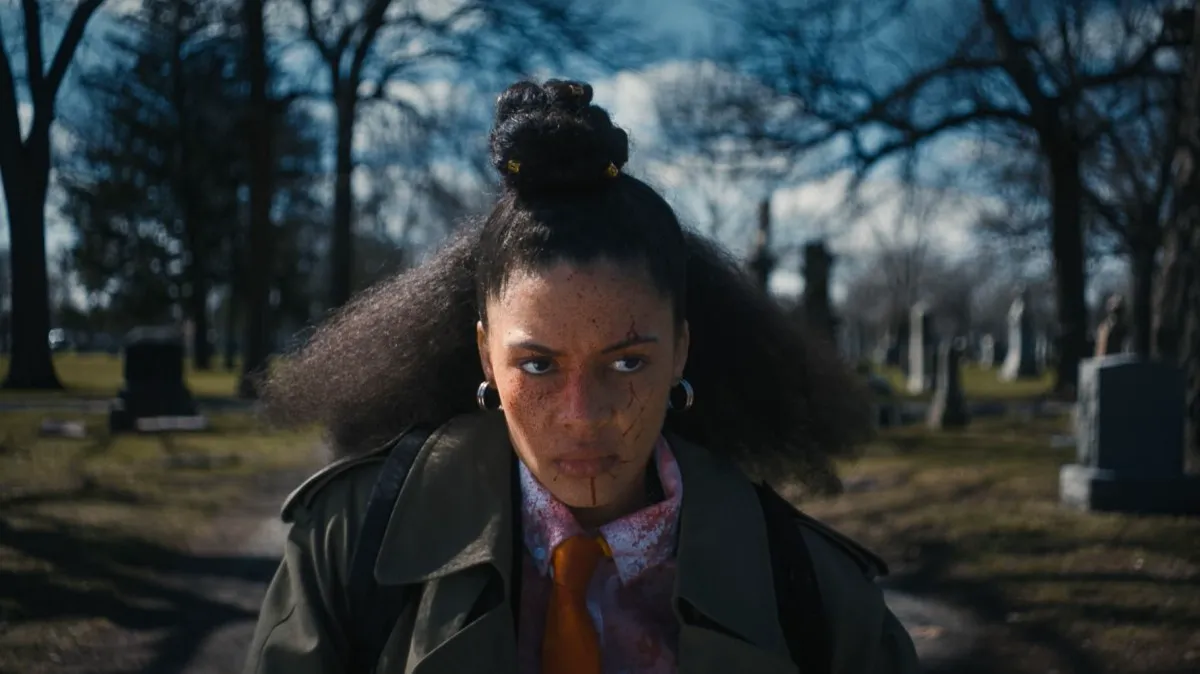Perpetrator: A Chilling Descent into Suburban Horror
Johnny Baptiste (Kiah McKirnan) is on the cusp of turning 18. The high schooler, raised by a single father (Tim Hopper) plagued by debilitating headaches, has never known her mother. During one particularly violent episode, her father injures himself and decides to send Johnny to live with her Aunt Hildie (Alicia Silverstone) in a remote town. In this new environment, Johnny discovers a mysterious ability to transform into other people, experiencing their heartbeats and thoughts. Perhaps these newfound supernatural talents can help her catch a serial killer, as five girls have already vanished in the town.

Alicia Silverstone as Hildie Baptiste in “Perpetrator”
A Director’s Exploration of Dark Themes
“Perpetrator” premiered at the Berlinale’s Panorama program and had its US debut at the Tribeca Film Festival in New York. Jennifer Reeder’s film has also been showcased at genre festivals in Neuchâtel and Fantasia in Montreal. Reeder, an American director who lives and teaches in Chicago, initially gained recognition for her short films before transitioning to distinctive feature-length projects. Her psychological thriller “Knives and Skin,” which explores the disappearance of a high school girl in a small Midwestern town, also screened in Berlin. Her horror film about exorcism, “A Night of Nightmares,” was released on Shudder, where she also directed a segment of the anthology “V/H/S/94.” Reeder is an intriguing filmmaker who deserves greater attention.
“Perpetrator” feels like a natural progression in her career. Similar to “Knives and Skin,” the story revolves around the disappearance of teenage girls in a quiet town, but this time, multiple girls have gone missing. Reeder, following in the footsteps of David Lynch, delves into the horrors lurking beneath the surface of idyllic American suburbia, with its pristine white fences and manicured lawns. However, unlike “Blue Velvet” and “Twin Peaks,” where male characters explored the dark underbelly of the familiar world, “Perpetrator” tells the story through the eyes of a young woman.

Kiah McKirnan as Johnny in “Perpetrator”
Coming-of-Age with a Supernatural Twist
Johnny is on the verge of turning 18 and becoming an adult. She experiences her first period, embracing her womanhood. Her ominous Aunt Hildie sees mystical power in this process of maturation. Johnny discovers new and unusual talents, which could be interpreted as a metaphor for the transition from childhood to adulthood. However, Reeder isn’t interested in creating another social drama or typical coming-of-age story; instead, she crafts a visually rich, surreal horror film.
A Disorienting Descent into Madness
The film’s individual episodes don’t immediately coalesce into a coherent narrative. Aunt Hildie performs a mysterious ritual and feeds her niece a cake laced with blood. Johnny’s father, and later Johnny herself, experience inexplicable facial transformations, resembling a glitchy deepfake or a malfunctioning Instagram filter. The school’s unhinged principal (Chris Lowell) conducts overly realistic anti-terrorism drills, running through the school in a terrifying mask with a toy machine gun, simulating a mass shooting. The town’s sole police officer (Josh Bywater) patrols the streets in his Ford pickup, watching everyone, leaving the viewer to question whether he’s protecting the citizens or is the killer himself. There’s also a teacher (Audrey Francis) who spends the entire film with bandages on her nose, possibly recovering from a rhinoplasty or abuse.

Kiah McKirnan as Johnny in “Perpetrator”
Visuals Over Narrative
Reeder’s visual style is far more compelling than the plot. During the most intense moments, she employs frantic editing, kaleidoscopic imagery, first-person perspectives, and GoPro effects. These techniques feel particularly jarring against the film’s otherwise deliberate pace. Reeder also draws inspiration from David Cronenberg, with several gruesome body transformations that could easily be mistaken for scenes from a sequel to “Crimes of the Future.”
In “Perpetrator,” it’s difficult to predict where the story will go next. The film is a fragmented mosaic of disturbing episodes that only vaguely come together in the end. However, the visual and narrative eclecticism can become tiresome. On a thematic level, “Perpetrator” shares similarities with Alex Garland’s recent film “Men.” While Reeder’s horror film doesn’t feature a Rory Kinnear playing every male character, there’s a palpable sense of patriarchal dominance. The killer could be anyone, and they’re all equally repulsive. The murderer changes masks, adapts to circumstances, and feels untouchable. And even if one is caught, another will inevitably take their place. Unfortunately, the American director doesn’t offer any new insights on this topic.
Johnny can only defeat the killer by mastering her own mystical powers, as she can inhabit the bodies of both the victims and the perpetrator. However, she can’t do it alone. Empathy and mutual support are the weapons women use to fight against countless male predators, but a new cycle of violence seems inevitable.